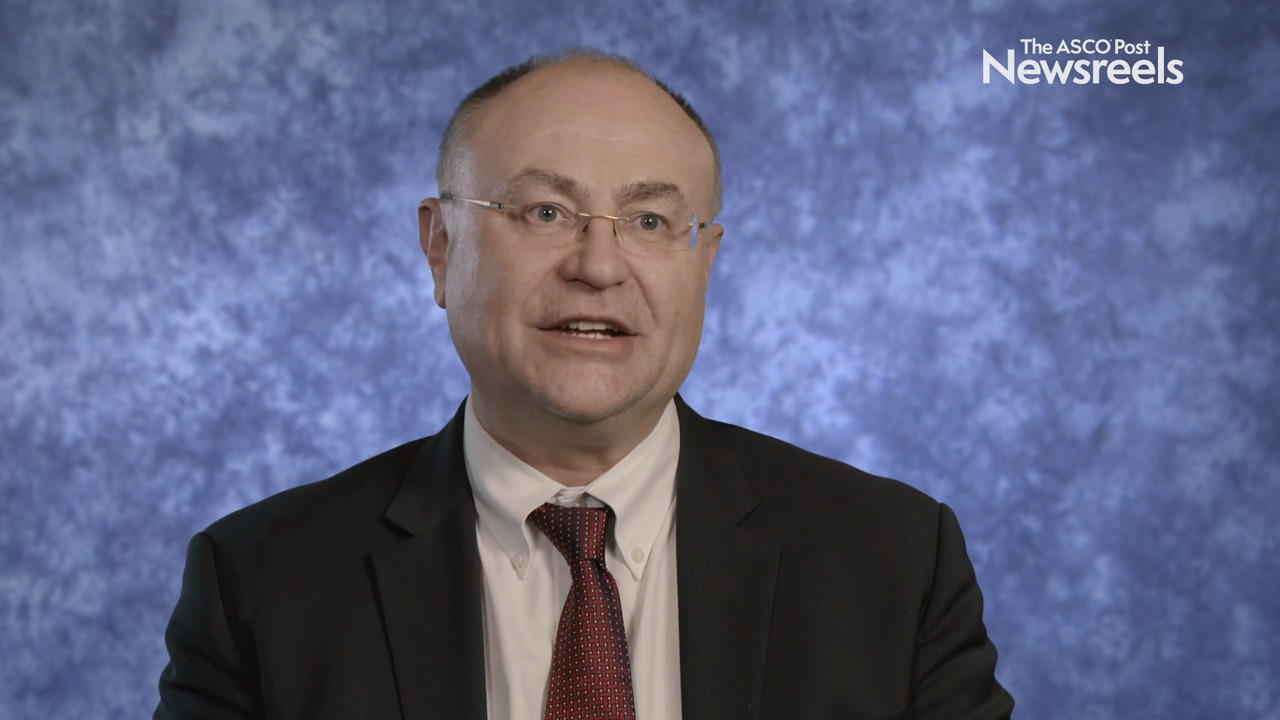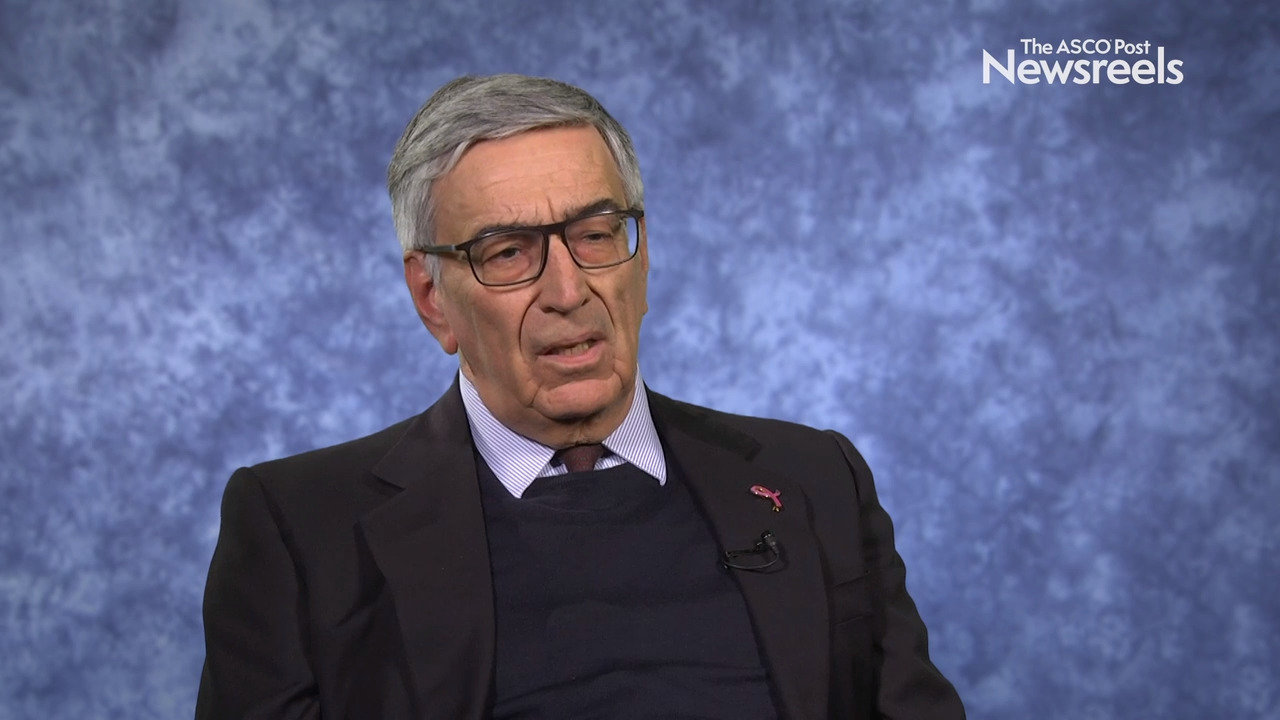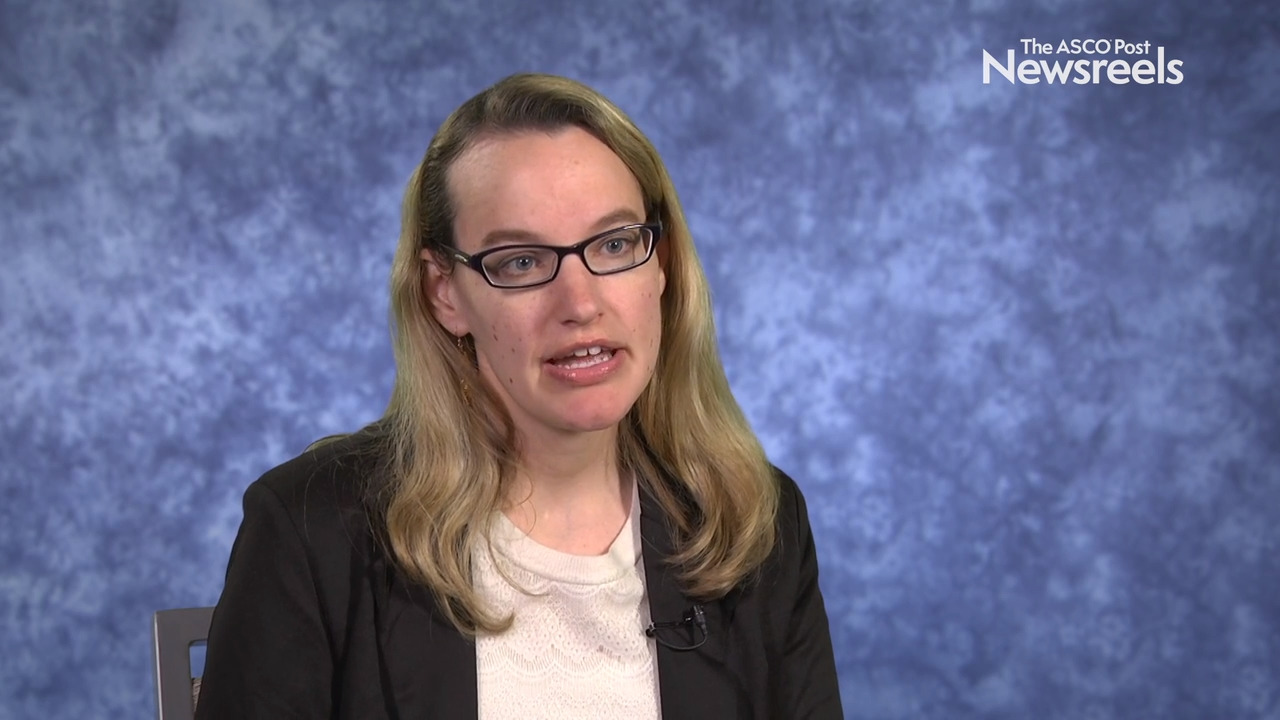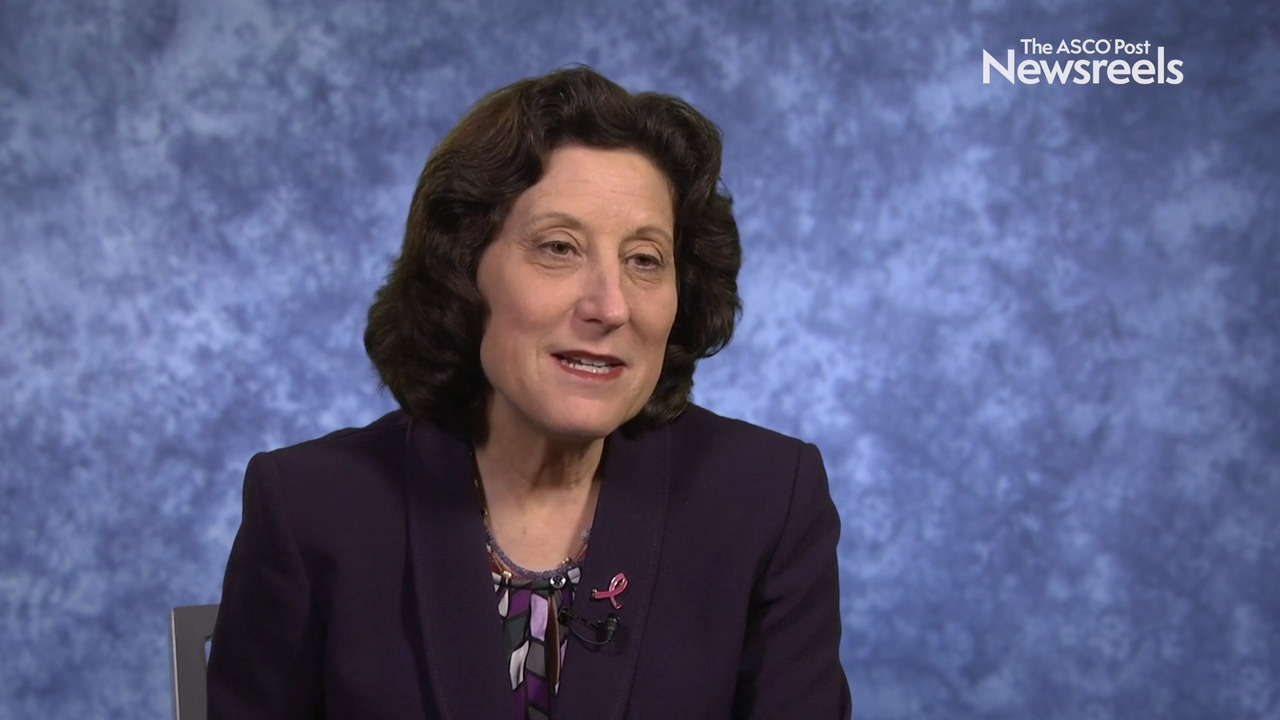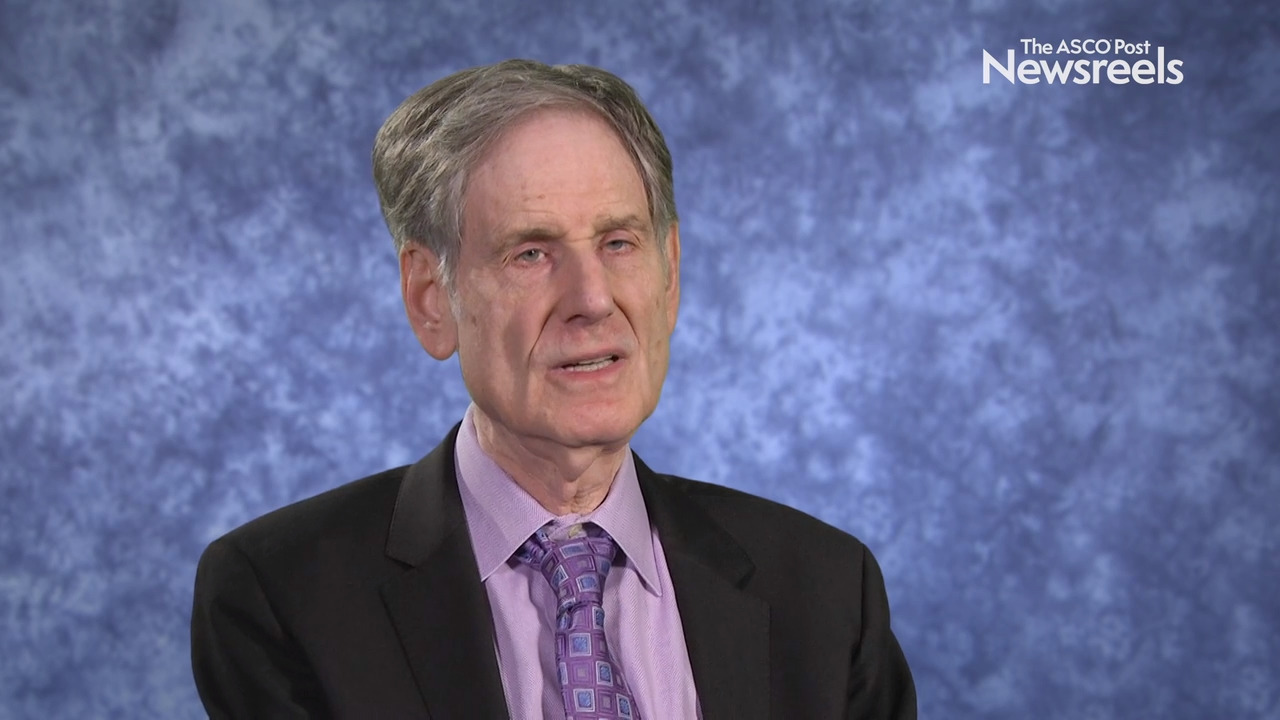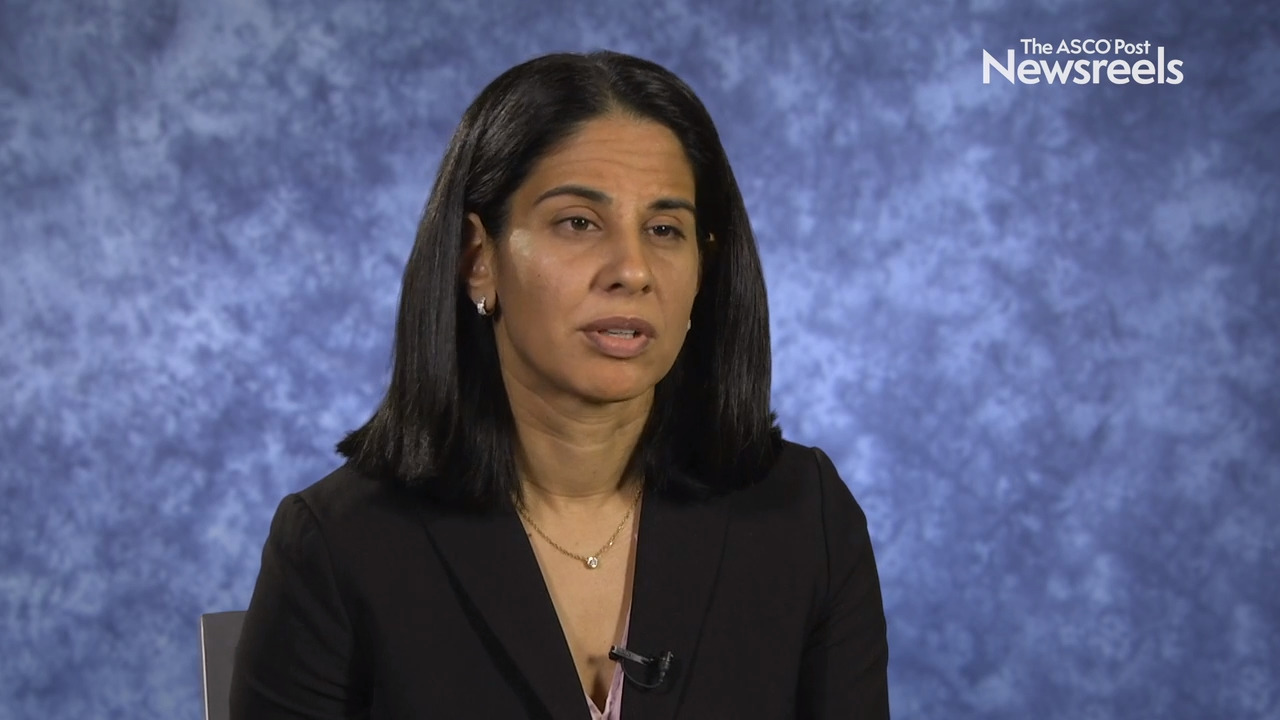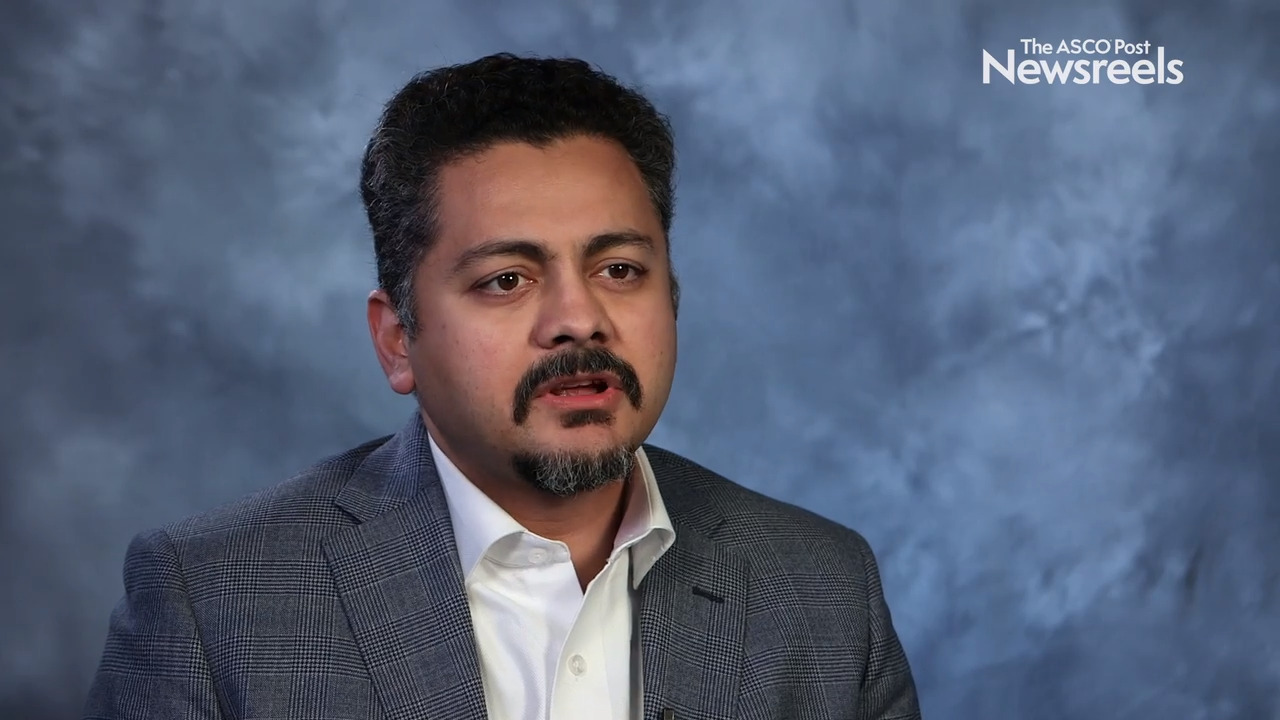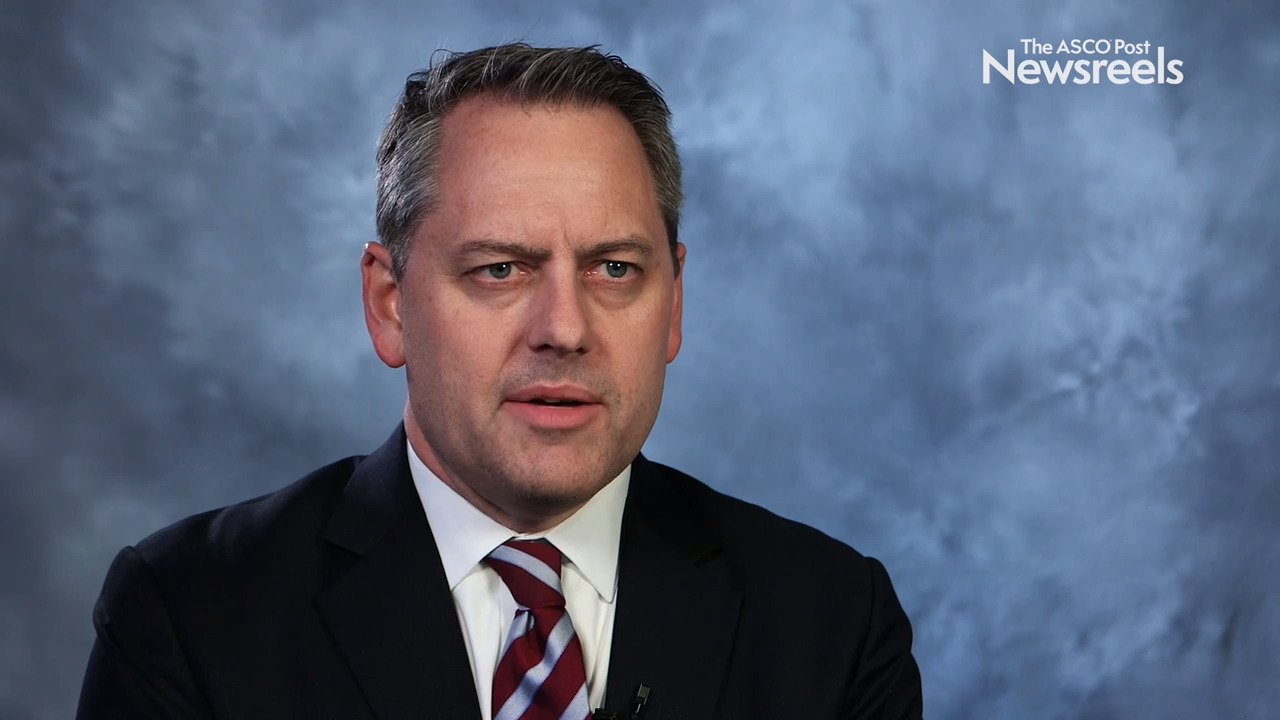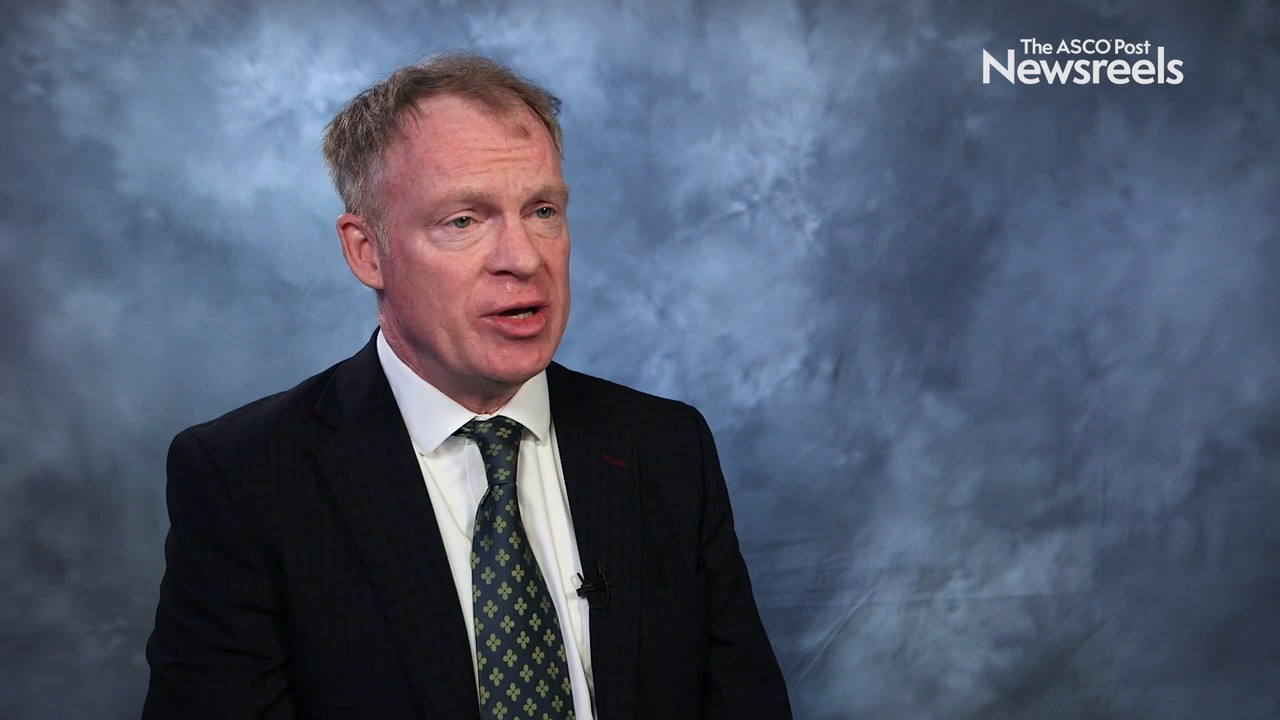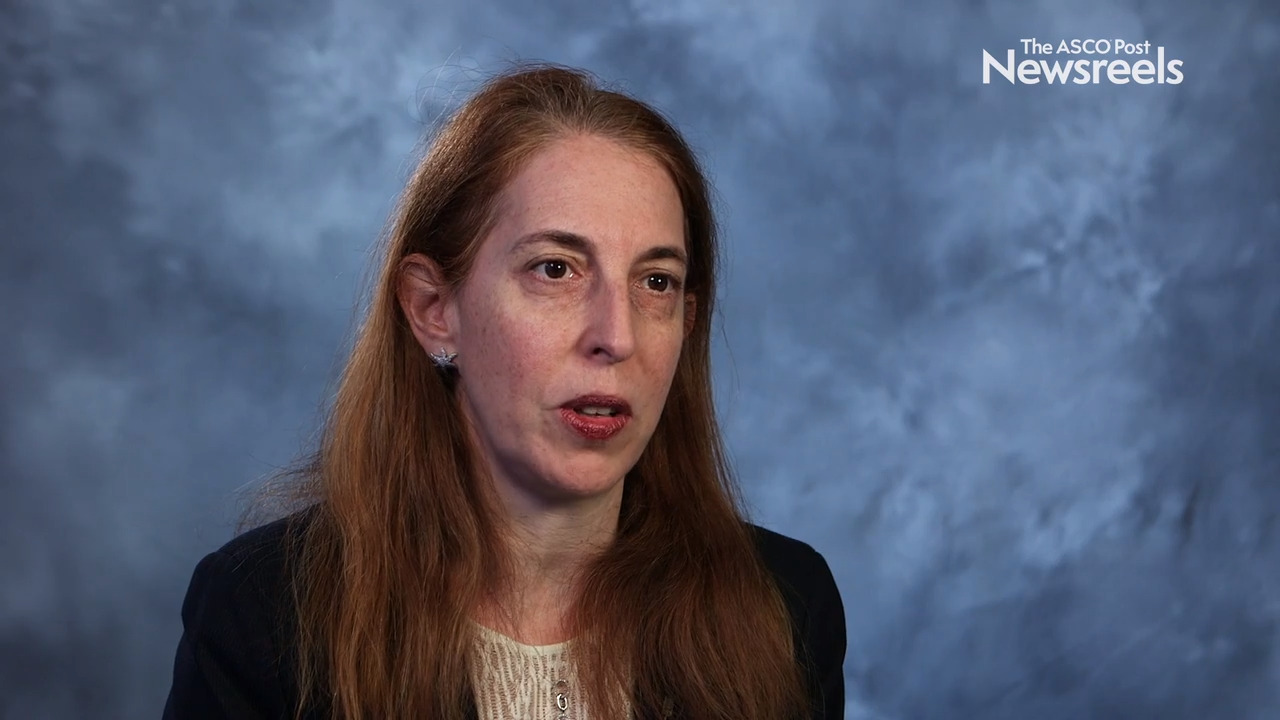Heinz-Josef Lenz, MD, on Metastatic Colorectal Cancer: Nivolumab Plus Low-Dose Ipilimumab as First-Line Therapy
Heinz-Josef Lenz, MD, of USC Norris Comprehensive Cancer Center, discusses how treating microsatellite instability–high/DNA mismatch repair–deficient metastatic colorectal cancer with nivolumab once every 2 weeks plus low-dose ipilimumab every 6 weeks may represent a new option for patients (Abstract 11).
Study Reports Similar Efficacy but No Less Toxicity With Adjuvant T-DM1 vs Taxane/Trastuzumab in Early Breast Cancer
The antibody-drug conjugate ado-trastuzumab emtansine (T-DM1) failed to show improved safety when compared with paclitaxel plus trastuzumab as adjuvant therapy in patients with stage 1 HER2-positive breast cancer. These results of the randomized, phase II ATEMPT trial were presented at the 2019 San ...
FDA Pipeline: Priority Reviews in Multiple Myeloma, Prostate Cancer
Over the past week, the U.S. Food and Drug Administration (FDA) granted Priority Review to treatments for multiple myeloma and prostate cancer; gave Fast Track designation to a targeted gene therapy for lung cancer; granted Orphan Drug designation to a combination therapy for hepatocellular...
Fam-trastuzumab Deruxtecan-nxki for Previously Treated Unresectable or Metastatic HER2-Positive Breast Cancer
On December 20, 2019, the antibody-drug conjugate fam-trastuzumab deruxtecan-nxki was granted accelerated approval in the treatment of patients with unresectable or metastatic HER2-positive breast cancer who have received two or more prior anti–HER2-based regimens in the metastatic setting.1,2...
Atezolizumab With Chemotherapy for Metastatic Nonsquamous NSCLC Without EGFR/ALK Aberrations
On December 3, 2019, atezolizumab in combination with nab-paclitaxel and carboplatin was approved for first-line treatment of metastatic nonsquamous non–small cell lung cancer (NSCLC) with no EGFR or ALK genomic tumore aberrations.1,2 The approval was based on findings in the open-label phase III...
Tucatinib Combination Extends Survival in HER2-Positive Metastatic Breast Cancer, Including Patients With Brain Metastases
For patients with progressing HER2-positive metastatic breast cancer previously treated with trastuzumab, pertuzumab, and ado-trastuzumab emtansine (T-DM1), no single regimen is an established standard of care. More than 50% of these patients will develop brain metastasis, and thus far, treatments...
Brentuximab Vedotin Plus Nivolumab in Hodgkin Lymphoma
The combination of brentuximab vedotin and nivolumab is making headway as first-line therapy for older adults with Hodgkin lymphoma and as salvage therapy for adults with relapsed or refractory classic Hodgkin lymphoma, according to separate studies presented at the 2019 Annual Meeting &...
Immune-Related Adverse Events and Recurrence-Free Survival With Adjuvant Immunotherapy vs Placebo in Stage III Melanoma
In an analysis of the EORTC 1325/KEYNOTE-054 trial of adjuvant pembrolizumab vs placebo in stage III melanoma reported in JAMA Oncology, Alexander M.M. Eggermont, MD, PhD, and colleagues found that patients treated with pembrolizumab who experienced immune-related adverse events had improved...
Three Studies Examine Relationship Between B-Cell Enrichment and Response to Immunotherapy
The likelihood of a patient responding to immune checkpoint blockade may depend on B cells in the tumor, located within specialized immune-cell clusters known as tertiary lymphoid structures, according to three studies all recently published in Nature. The studies showed that enrichment of B cells...
FDA Pipeline: Priority Reviews in Ovarian Cancer, Prostate Cancer, and NSCLC
This week, the U.S. Food and Drug Administration (FDA) granted Priority Review to treatments for ovarian, prostate, and lung cancer; granted Orphan Drug designation to therapies for chemotherapy-induced thrombocytopenia and multiple myeloma; and granted Breakthrough Device designation to platforms...
Maintenance Bevacizumab With or Without Pemetrexed in Advanced Nonsquamous NSCLC
In a Japanese phase III trial reported in the Journal of Clinical Oncology, Seto et al found that the addition of maintenance pemetrexed to bevacizumab did not significantly improve overall survival in patients with previously untreated, advanced nonsquamous non–small cell lung cancer (NSCLC)...
Expert Point of View: Howard J. Weinstein, MD
Commenting on the blinatumomab study, Howard J. Weinstein, MD, Chief of Pediatric Hematology-Oncology at Massachusetts General Hospital for Children and Harvard Medical School in Boston, said: “These are very promising results for children, adolescents, and young adults who have had a first...
Blinatumomab Outperforms Chemotherapy as Post-Reinduction Consolidation Therapy in Younger Patients With B-Cell ALL
Blinatumomab was superior to standard chemotherapy in children, adolescents, and young adults at the first relapse of B-cell acute lymphoblastic leukemia (ALL) as post-reinduction consolidation therapy prior to hematopoietic stem cell transplant (HSCT), according to the results of a late-breaking...
Different Doses of Adjuvant Ipilimumab vs High-Dose Interferon Alfa-2b in Patients With Resected High-Risk Melanoma
As reported in the Journal of Clinical Oncology by Tarhini et al, the phase III Intergroup E1609 trial has shown an overall survival advantage with adjuvant ipilimumab at 3 mg/kg—but not at 10 mg/kg—vs high-dose interferon alfa-2b in patients with resected high-risk cutaneous melanoma. The...
Preliminary Data on Multiantigen-Targeted CAR NK-Cell Therapy for B-Cell Malignancies
A novel off-the-shelf chimeric antigen receptor natural killer cell (CAR-NK) product called FT596 may prove to be an active therapy for B-cell malignancies. This agent is designed to overcome several challenges inherent in CAR T-cell therapy, including CD19-antigen escape, which leads to relapse in ...
Addition of Olaparib to Bevacizumab Maintenance in Patients With Advanced Ovarian Cancer Responding to First-Line Therapy
As reported in The New England Journal of Medicine by Isabelle Ray-Coquard, MD, PhD, and colleagues, the phase III PAOLA-1 trial has shown a progression-free survival benefit with the addition of olaparib to bevacizumab maintenance in patients with advanced ovarian cancer responding to first-line...
Noninferiority of Four vs Six Cycles of CHOP for Patients With Favorable Prognosis B-Cell Lymphoma: FLYER Trial
As reported in The Lancet by Viola Poeschel, MD, and colleagues, the phase III FLYER trial has shown noninferiority of progression-free survival with four vs six cycles of cyclophosphamide/doxorubicin/vincristine/prednisone (CHOP) in combination with six doses of rituximab in patients with...
FDA Approves PD-1 Inhibitor for BCG-Unresponsive, High-Risk Non–Muscle Invasive Bladder Cancer
Today, the U.S. Food and Drug Administration (FDA) approved pembrolizumab (Keytruda) for the treatment of patients with bacillus Calmette-Guérin (BCG)-unresponsive, high-risk, non–muscle invasive bladder cancer with carcinoma in situ with or without papillary tumors who are ineligible for or have...
Is Pembrolizumab Active in Pediatric Patients With PD-L1–Positive Advanced Solid Tumors or Lymphoma?
Interim analysis of the phase I/II KEYNOTE-051 trial, reported in The Lancet Oncology by Geoerger et al, indicated minimal activity of pembrolizumab in pediatric patients with programmed cell death ligand 1 (PD-L1)-positive advanced, relapsed, or refractory solid tumors; however, activity was...
Pembrolizumab in KRAS-Mutant and Wild-Type PD-L1–Positive Nonsquamous NSCLC
In an analysis reported in Annals of Oncology, Roy S. Herbst, MD, PhD, and colleagues found that pembrolizumab was active in both KRAS-mutant and wild-type tumors in a subgroup of patients in the KEYNOTE-042 trial with programmed cell death ligand 1 (PD-L1)-positive nonsquamous non–small cell lung...
JAVELIN Bladder 100 Study of Avelumab for Urothelial Cancer Meets Primary Endpoint
The phase III JAVELIN Bladder 100 trial met its primary endpoint of overall survival at the planned interim analysis. In this study, patients with previously untreated locally advanced or metastatic urothelial carcinoma whose disease did not progress on induction chemotherapy and who were randomly...
Overall Survival With the Addition of Daratumumab to VMP in Newly Diagnosed, Transplant-Ineligible Multiple Myeloma
As reported in The Lancet by Maria-Victoria Mateos, MD, and colleagues, interim analysis of overall survival in the phase III ALCYONE trial has shown a significant benefit of the addition of daratumumab to bortezomib, melphalan, and prednisone (D-VMP) in patients with newly diagnosed multiple...
Rituximab-abbs: Biosimilar to Rituximab for Non-Hodgkin Lymphoma
In the Clinic provides overviews of novel oncology agents, addressing indications, mechanisms of action, administration recommendations, safety profiles, and other essential information needed for the appropriate clinical use of these drugs. Late in 2018, rituximab-abbs was approved as the first...
KEYNOTE-013 and KEYNOTE-170: Improving the Precision of Checkpoint Blockade in Patients With Diffuse Large B-Cell Lymphoma
Primary mediastinal B-cell lymphoma is an uncommon but distinct clinicopathologic variant of diffuse large B-cell lymphoma (DLBCL) that typically presents with an aggressive mediastinal mass and invasion of local structures. Most patients are young, typically in their 20s and 30s, and there is a...
Pembrolizumab in Relapsed or Refractory Primary Mediastinal Large B-Cell Lymphoma: KEYNOTE-013 and KEYNOTE-170
Findings in the phase Ib KEYNOTE-013 and phase II KEYNOTE-170 trials, reported in the Journal of Clinical Oncology by Philippe Armand, MD, PhD, of DanaFarber Cancer Institute, and colleagues, indicate that pembrolizumab is active in relapsed or refractory primary mediastinal large B-cell...
Pembrolizumab vs Cetuximab Plus Chemotherapy in Recurrent or Metastatic Head/Neck Squamous Cell Cancer
As reported in The Lancet by Barbara Burtness, MD, of the Department of Medicine, Yale University School of Medicine, and colleagues, the phase III KEYNOTE-048 trial has shown improved overall survival with first-line pembrolizumab plus chemotherapy vs cetuximab plus chemotherapy among patients...
FDA Pipeline: Priority Reviews in SCLC, Bladder Cancer, Colorectal Cancer
Recently, the U.S. Food and Drug Administration (FDA) granted Priority Reviews for treatments in extensive-stage small cell lung cancer (SCLC), non–muscle invasive bladder cancer, and BRAF V600E–mutant colorectal cancer. The Agency also recently issued multiple Breakthrough Therapy designations and ...
Fractionated Tisagenlecleucel Infusion for Adults With B-Cell Acute Lymphoblastic Leukemia May Improve Safety Without Reducing Efficacy
As reported by Noelle V. Frey, MD, and colleagues in the Journal of Clinical Oncology, single-center experience with the anti-CD19 chimeric antigen receptor (CAR) T-cell therapy tisagenlecleucel has shown that high-dose fractionated infusion with the ability to modify dosing in case of early signs...
Nivolumab for Mismatch Repair–Deficient Noncolorectal Cancers
In a study (NCI-MATCH trial subprotocol, arm Z1D) reported in the Journal of Clinical Oncology, Azad et al found that nivolumab was active in mismatch repair–deficient noncolorectal cancers. As stated by the investigators, “The National Cancer Institute Molecular Analysis for Therapy Choice...
Phase Ib/II Studies Explore Next-Generation BCMA-Targeted CAR T-Cell Therapies in Multiple Myeloma
In patients with relapsed or refractory multiple myeloma, two novel dual-target chimeric antigen receptor (CAR) T-cell strategies are yielding early and durable responses, with seemingly less cytokine-release syndrome and neurotoxicity than first-generation CAR T-cell products, according to the...
ESMO Immuno-Oncology 2019: Safety Analysis Results for First-Line Durvalumab Plus Platinum/Etoposide in Extensive-Stage SCLC
Few grade 3 or higher immune-related adverse events were observed in patients treated with first-line durvalumab plus platinum/etoposide for extensive-stage small cell lung cancer (SCLC), according to findings from the safety analysis of the phase III CASPIAN study presented by Özgüroğlu et al at...
Does Second-Line Pembrolizumab in Patients With Advanced Hepatocellular Carcinoma Previously Treated With Sorafenib Confer a Survival Benefit?
As reported in the Journal of Clinical Oncology by Richard S. Finn, MD, and colleagues, the phase III KEYNOTE-240 trial has shown no statistically significant progression-free or overall survival benefit with pembrolizumab vs placebo in patients with advanced hepatocellular carcinoma who were...
Pembrolizumab in Refractory Metastatic Castration-Resistant Prostate Cancer
In the phase II KEYNOTE-199 study, reported in the Journal of Clinical Oncology by Antonarakis et al, pembrolizumab showed activity and had an acceptable safety profile in patients with treatment-refractory metastatic castration-resistant prostate cancer. Study Details The trial was conducted at 85 ...
First-Line Atezolizumab Plus Nab-paclitaxel in Advanced Triple-Negative Breast Cancer: Second Overall Survival Interim Analysis
As reported in The Lancet Oncology by Peter Schmid, MD, and colleagues, the prespecified second interim analysis of overall survival in the phase III IMpassion130 trial has shown no overall survival benefit with the addition of atezolizumab to nab-paclitaxel as first-line treatment of unresectable, ...
Lung Cancer Expert Julie R. Brahmer, MD, MSc, Was an Early Believer in Immunotherapy—and Still Is
Lung cancer specialist Julie R. Brahmer, MD, MSc, comes from a long line of Midwest farmers who still run a family operation. “I’m originally from what I would call the middle of nowhere in Nebraska. My father is a sixth-generation farmer, and my mother is a nurse. I was inclined toward medicine at ...
Immunotherapy for Head/Neck Squamous Cell Carcinoma: Questions Raised by KEYNOTE-048
There is a new first-line treatment option for patients with newly diagnosed, recurrent, or metastatic head and neck squamous cell carcinoma. As reported by Burtness et al in The Lancet, pembrolizumab improved overall survival vs the standard-of-care regimen of cetuximab and platinum-based...
ESMO Immuno-Oncology 2019: First-Line Immunotherapy Combination for Patients With Advanced NSCLC and Comorbidities or Poor Performance Status
First-line treatment with the combination of nivolumab and ipilimumab was safe and provided encouraging overall survival results in patients with advanced non–small cell lung cancer (NSCLC), as well as in patients with NSCLC traditionally not eligible for clinical trials—such as those who had...
ESMO Immuno-Oncology 2019: CXCR4 Inhibitor in Combination With Pembrolizumab/Chemotherapy for Metastatic Pancreatic Cancer
When the CXCR4 inhibitor BL-8040 was combined with the programmed cell death protein 1 (PD-1) inhibitor pembrolizumab plus chemotherapy in the second-line setting, the regimen showed promising antitumor activity in patients with metastatic pancreatic ductal adenocarcinoma. These findings were...
ESMO Immuno-Oncology 2019: Sitravatinib/Tislelizumab Shows Antitumor Activity in Ovarian Cancer
Results from a phase Ib study reported at the European Society for Medical Oncology (ESMO) Immuno-Oncology Congress 2019 showed manageable safety and encouraging antitumor activity in patients with advanced ovarian cancer treated with the novel combination of sitravatinib and tislelizumab. These...
Luca Gianni, MD, on the Neoadjuvant Treatment of Triple-Negative Breast Cancer
Luca Gianni, MD, of the Fondazione Michelangelo, discusses findings from the NeoTRIP trial on pathologic complete response to neoadjuvant treatment with or without atezolizumab in triple-negative, early high-risk, and locally advanced breast cancer (Abstract GS3-04).
Ariella B. Hanker, PhD, on Therapeutic Implications of HER2 and HER3 Mutations in Breast Cancer
Ariella B. Hanker, PhD, of UT Southwestern Medical Center, discusses data showing that breast cancers expressing co-occurring HER2 and HER3 mutations may require the addition of a phosphoinositide 3-kinase alpha inhibitor to a HER2 tyrosine kinase inhibitor (Abstract GS6-04).
Hope S. Rugo, MD, on HER2-Positive Metastatic Breast Cancer: SOPHIA Trial of Chemotherapy Plus Margetuximab or Trastuzumab
Hope S. Rugo, MD, of the University of California San Francisco Comprehensive Cancer Center, discusses trial data on margetuximab plus chemotherapy, which improved progression-free survival in patients with previously treated HER2-positive metastatic breast cancer when compared with trastuzumab plus chemotherapy. Maturing data comparing overall survival also provides new insights (Abstract GS1-02).
Ralph R. Weichselbaum, MD, on Oligometastatic Cancer: The Role of Radioimmunotherapy
Ralph R. Weichselbaum, MD, of the University of Chicago, summarizes a plenary lecture in which he presented data that could guide future clinical strategies: studies supporting the basis and classification of oligometastatic disease, including breast cancer; and basic and clinical data on radioimmunotherapy (Abstract PL2).
Sara M. Tolaney, MD, MPH, on HER2-Positive Breast Cancer: ATEMPT Trial on T-DM1 vs Paclitaxel Plus Trastuzumab
Sara M. Tolaney, MD, MPH, of Dana-Farber Cancer Institute, discusses phase II findings on patients receiving T-DM1 monotherapy as adjuvant treatment for stage I HER2-positive breast cancer, a regimen associated with few recurrences in the study population (Abstract GS1-05).
SABCS 2019: Does Treatment With Pembrolizumab Improve Pathologic Complete Response in Patients With Triple-Negative Breast Cancer and Lymph Node Involvement?
The addition of the checkpoint inhibitor pembrolizumab to neoadjuvant chemotherapy and as adjuvant therapy increased the rates of pathologic complete response in patients with triple-negative breast cancer who had lymph node involvement, according to results from the KEYNOTE-522 trial, which were...
Saad Z. Usmani, MD, on Carfilzomib, Dexamethasone, and Daratumumab for Relapsed or Refractory Myeloma
Saad Z. Usmani, MD, of the Levine Cancer Institute, discusses phase III study findings suggesting that the combination of carfilzomib/dexamethasone/daratumumab represents an efficacious new regimen for patients with relapsed or refractory disease, including those refractory to lenalidomide (Abstract LBA-6).
Jeff P. Sharman, MD, on CLL: Trial Results on Acalabrutinib, Obinutuzumab, and Chlorambucil
Jeff P. Sharman, MD, of the Willamette Valley Cancer Institute and US Oncology Research, discusses phase III findings from the ELEVATE TN study, which showed that acalabrutinib plus obinutuzumab and acalabrutinib monotherapy improved progression-free survival in patients with treatment-naive chronic lymphocytic leukemia (Abstract 31).
C. Ola Landgren, MD, PhD, on Carfilzomib, Lenalidomide, Dexamethasone, and Daratumumab for Newly Diagnosed Multiple Myeloma
C. Ola Landgren, MD, PhD, of Memorial Sloan Kettering Cancer Center, discusses phase II study findings that showed an 83% negative rate of minimal residual disease in newly diagnosed multiple myeloma treated weekly with 8 cycles of the quadruplet regimen of carfilzomib/lenalidomide/dexamethasone/daratumumab, without autologous stem cell transplant (Abstract 862).
Patrick A. Brown, MD, on B-Cell ALL in Children, Adolescents, and Young Adults: Blinatumomab vs Chemotherapy
Patrick A. Brown, MD, of Johns Hopkins University, discusses phase III findings from a Children’s Oncology Group Study showing that blinatumomab was superior to chemotherapy in terms of efficacy and tolerability for young patients as a post-reinduction therapy in the setting of high- and intermediate-risk first relapse of B-cell acute lymphoblastic leukemia (Abstract LBA-1).
Catherine M. Diefenbach, MD, on Follicular Lymphoma: Polatuzumab Vedotin Plus Obinutuzumab/Lenalidomide
Catherine M. Diefenbach, MD, of the Perlmutter Cancer Center at NYU Langone, discusses a primary analysis of a phase Ib/II trial showing that the novel triplet combination of polatuzumab vedotin plus obinutuzumab/lenalidomide is safe and effective, with high complete response rates seen in a heavily pretreated and refractory population (Abstract 126).
